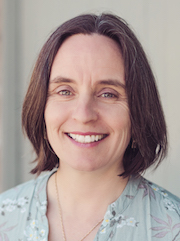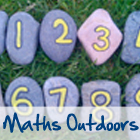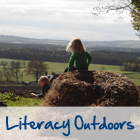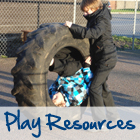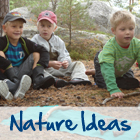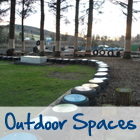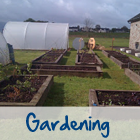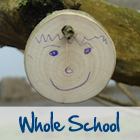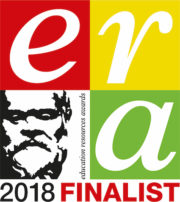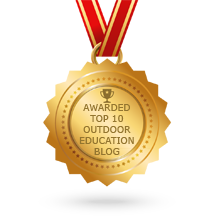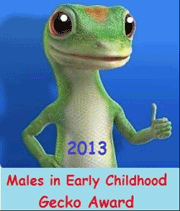Fully Outdoor Settings
There is a growth in pre-schools where children spent their time almost entirely outside. These come under the guise of many names. For example, in Sweden, it is “I Ur och Skur” which is “In Rain or Shine.” pre-schools. Norway tends to call its outdoor settings “Outdoor” or “Nature” Kindergartens. In Lithuania, the common term is “Outdoor Kindergarten.” In Germany, the collective name is “Waldkindergarten”.
Across Scotland, there are an increasing number Early Learning and Childcare services that are registered as fully outdoor settings. The term “Forest Kindergarten” or “Nature Kindergarten” are not exclusively used for outdoor settings within Scotland.
In Scotland, fully outdoor settings are registered with our Care Inspectorate and are one of four early learning and childcare modelled recognised. These are described in this practice note: Delivering Play and Learning Environments Outdoors They call themselves outdoor nurseries, nature kindergartens, woodland kindergarten and more! You can find a list of Scottish outdoor settings on this blog post. It is great to see that our outdoor settings have such a diversity of influences and pedagogy. Many early learning and childcare settings refer to their weekly (or more frequent) sessions in local greenspace as “Forest Kindergarten” or “Nature Kindergarten.”
For the international links and downloadable case studies and blog posts about fully outdoor early years practice please visit this blog post.
Forest Kindergarten in Scotland
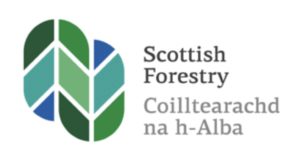
World wide there is an increasing awareness about the value of enabling young children to access natural spaces such as woodlands or beaches. This page explains the background to Forest Kindergarten in Scotland that has been developed by Scottish Forestry since 2009. Further information can also be found on the OWLS website.
Glasgow and the Clyde Valley Forest Kindergarten Pilot
In 2008-09 Juliet, along with Lynnette Borradaile, Penny Martin, Steve Alker and Toni Clark undertook a feasibility study to establish a Forest Kindergarten Pilot project in Central Scotland in partnership with local authorities. This involved empowering early years educators to lead weekly sessions in their local woodland or other greenspace using a child-centred approach. The term “Forest Kindergarten” was chosen as it had to reflect the funding by Forestry Commission Scotland and its early years emphasis.
If you wish to see more of the original material relating to the Scottish Forestry FK training and approach, please contact Juliet. Three appendices may be of particular interest:
- Appendix 8: Staff Training and the Introduction of Forest Kindergarten. This shows the key influences behind the Scottish Forestry FK training
- Appendix 9: A Case Study of the Secret Garden Outdoor Nursery: A useful snapshot in time, and Cathy Bache’s approach.
- Appendix 10: Expanding the Horizons of Outdoor Play. This is referenced in Curriculum for Excellence through Outdoor Learning, p17
This video is from one of the original ELC settings involved in the original Forest Kindergarten pilot
The Development of Forest Kindergarten Training
In 2011-12, Juliet worked with the Forest Kindergarten Development Officer, Karen Boyd, to develop an early years Forest Kindergarten training package for pre-school practitioners. It was a sustainable and rights-based approach, based upon their many combined years of practical experience along with inspiration and observation of practice in other countries, including Sweden and the Czech Republic, based upon Juliet’s Churchill Fellowship to these countries. The Fife Nature Kindergarten model developed by Chris Miles was also an influence.
The course was developed as a 3-day training programme because it was felt that there was a lot needed to be included. The course and handouts look at the practicalities around:
- Place – Finding and preparing a site including appraising it, undertaking a risk benefit of the site and considering how to care the place and to involve children in this process.
- People – Observing children in an FK session, preparing children, working with staff and parents.
- Pedagogy – Being in nature and relying on the wood as a source of inspiration, creativity and imagination; integrating FK into the routine and life of a nursery all year round.
The first pilot of the Forest Kindergarten training took place in February 2012. North Lanarkshire trialled the model. Since then many more courses have run in this local authority and others in Central Scotland. Edinburgh City Council currently runs Forest Kindergarten as an in-house qualification. Aberdeen City have provided Wee Green Spaces training based upon the Forest Kindergarten model.
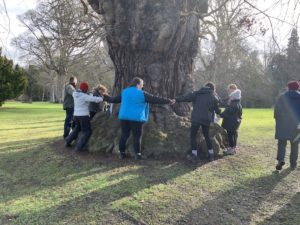
Furthermore, additional training has, in the past, been offered to give practitioners an opportunity to learn how to use fire, tools and ropes as well as the use of family forest bags. There was also an introduction to Forest Kindergarten specifically aimed at school and early years and childcare managers developed by Marian Cairns. The three-day training and follow up support offered by Scottish Forestry was been independently evaluated in 2014-15 and received very positive feedback.
Since the first training course pilot, the Forest Kindergarten model has been continuously refined and developed. Scottish Forestry is keen ensure that the model is manageable, sustainable and remains fit for purpose. There are now a range of videos and additional material which may be of interest:
- Education Scotland information and video where Marian Cairns gives a clear overview at the Scottish Learning Festival, 2015.
- A Practitioner’s Guide – Forest Kindergarten Training. An account of an 18yr old student’s experience of going through the 3-day training
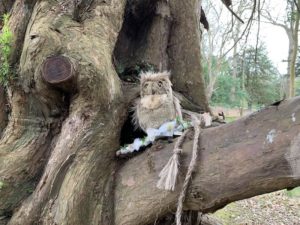
Forest kindergarten: key things to know
The FK course is built around the needs of EY practitioners to be upskilled in regard to being outdoors and off-site
The course has been developed by early years outdoor professionals for the early years sector. It is about practicalities of setting up frequent and regular visits, usually weekly, all year round and in almost all weathers to local woods. Use of fire, tools and rope work are not included. These skills can be acquired later, once the routines of using a local wood have been established.
The FK course builds upon the skills and role of an EY practitioner
EY practitioners are skilled professionals who know about the need to observe, reflect on their practice, be responsive to their children and ensure their care and learning needs are met. The course does not go into observations, approaches to planning and so on, because this is something EY practitioners already know. It does not ask participants to create an FK handbook but rather integrate FK into their practice. For example, a nursery’s safeguarding policy would include reference to safeguarding at an FK session. There would not be a separate policy for Forest Kindergarten.
The FK course empowers EY practitioners to set up and lead FK sessions as part of their weekly routine
It’s a course designed for those who are working as EY practitioners in a nursery and not external providers or partner organisation to run FK sessions for a nursery. This misses the point of empowering EY practitioners and ensuring permanent, sustainable changes to practice within the early years sector.
The FK course is not an alternative to, or substitute for, Forest School training
A Forest Kindergarten-trained practitioner could go on to undertake FS training to further deepen their practice. Likewise, Forest School-trained EY practitioners are able to attend FK training and come away with skills, knowledge and understanding that they did not previously have.
The FK course takes a sustainable and rights-based approach
A key emphasis of Forest Kindergarten is taking a participatory approach to establishing FK sessions that involves children, their families and other stakeholders. It is set in the context of Curriculum for Excellence and the suite of outdoor learning and play documents that exists to support EY practitioners. Furthermore, it makes links between the UN Rights of a Child and the rights and responsibilities of all as outlined in the Scottish Outdoor Access Code.
The FK course is now an SQA national workplace award
The development of the FK training into a national qualification was undertaken in 2016-17 by Sarah Archer, the Forest Kindergarten Development Officer at that time.
Since 2018, Scottish Forestry has run three “Train the FK Trainer” training sessions for EY college lecturers and other SVQ centres wishing to offer this course as an accredited qualification. Several organisations now offer this within Scotland including:

In recent years, the scope of the Scottish Forestry Forest Kindergarten course has had to broaden the scope of its cover. More settings are looking to increase the time spent in woods and greenspace for a variety of reasons. However it remains a basic introductory course.

